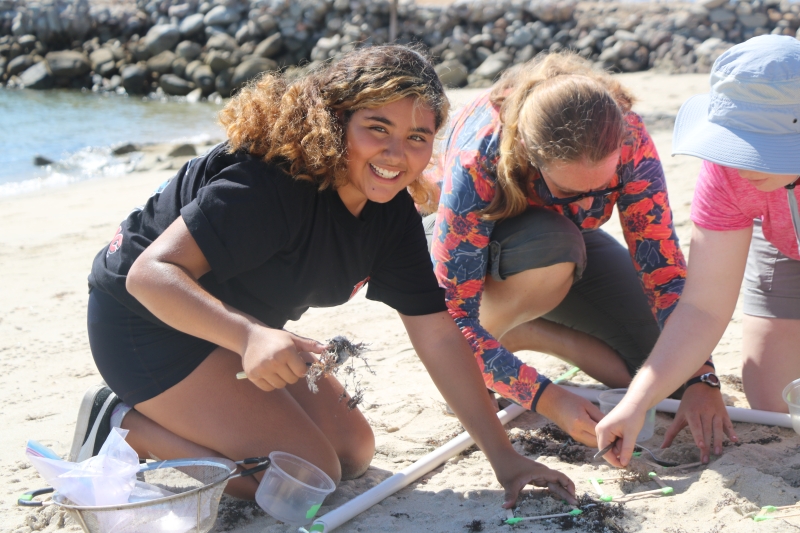This project was funded through the 2020 United States Mexico Canada Agreement (USMCA) Implementation Act (P.L. 116-113), which provided the NOAA Marine Debris Program funding to prevent and reduce marine debris in the North American region. Chapter 24 of the USMCA includes specific environmental goals that highlight the need to take action to prevent and reduce marine debris, including plastic litter and microplastics, in order to preserve human health and marine and coastal ecosystems, prevent the loss of biodiversity, and mitigate the costs and impacts of marine debris. This project was awarded competitively and meets the environment goals of the USMCA by promoting waste infrastructure and reducing sources of marine debris from tourism in Mexico that impact wildlife and our ocean.
The Vermilion Sea Institute expanded the work and research of local youth in the Aventureros educational program to support the Bahía de los Ángeles community in Baja California, Mexico in reducing waste and sources of marine debris..
Type of Project: North America Marine Debris Prevention and Removal
Region: Mexico
Project Dates: October 2022 - September 2024
Who was involved?
With the support of the NOAA Marine Debris Program, the Vermilion Sea Institute worked alongside the Aventureros and other local youth to become community marine debris prevention leaders. Other key partners on the project included Marea Viva and local restaurants.
What was the project and why is it important?
Bahía de los Ángeles is a coastal town along the coast of Baja California, Mexico. While the local population is small, the town attracts tourists year-round due to its warm weather and designation as a United Nations Educational, Scientific and Cultural Organization Marine World Heritage Site. This influx of tourists, coupled with the need for more waste disposal options, has resulted in large amounts of plastic waste and trash throughout the town’s beaches and wetlands, impacting important marine ecosystems and community food sources.
The Vermilion Sea Field Station is located in Bahía de los Ángeles and is the home of the Aventureros program, a free year-round youth program that supports local students, ages 7-17, in discovering and caring for the marine and terrestrial worlds around them to grow into the next generation of conservation leaders. Using previously collected local marine debris data, Vermilion Sea Institute team members worked alongside the Aventureros to tackle marine debris at its source through a place-based debris prevention initiative: Aventureros Averting Plastics for a Better Baja. Together they installed four community-designed waste receptacles and implemented a collection process where plastics could be upcycled to create eco-bricks that can be used for sustainable construction projects. Marea Viva, a local community group, helped to design and run the new plastic disposal system. This initiative also engaged local community members and businesses by hosting monthly beach and desert cleanup events and working with participating restaurants on a sustainable takeout container subscription service.
What were the results?
The Aventureros and greater Bahía de los Ángeles community conducted 16 dedicated beach, ocean, and desert cleanup events that successfully removed 2,213 pounds of debris, all of which was recycled by Marae Viva at their recycling facility. In addition, 15 shoreline surveys were conducted utilizing the NOAA Marine Debris Monitoring and Assessment Project shoreline survey protocols, revealing that around 55% of debris found on these shorelines are made of plastic.
The project’s sustainable to-go container program garnered the interest of 25 individual food vendors and replaced 17,300 to-go single-use items.
Lastly, the project team conducted a vast array of community events and education efforts resulting in the engagement of well over 1,000 individual youth, adults, and visiting scientists.
 An official website of the United States government.
An official website of the United States government. 

